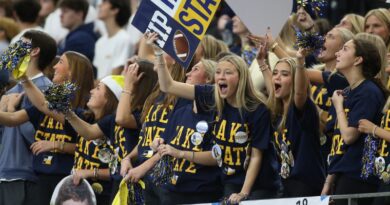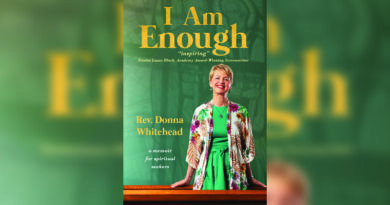ESD Trial, Day 20 UPDATED
The civil trial against the Episcopal School of Dallas resumes today, and rumor has it the defense just might rest. Anything is possible, though, as ESD could easily drag its side out for many more days considering the size of its witness list and the ability to recall those who’ve already taken the stand for the plaintiffs.
While speed has not been the hallmark of this trial, perhaps we’ll get a few rulings out of Judge D’Metria Benson this a.m. The main issue is the admissibility of Mary Smith’s testimony as well as ESD’s desire to call other current/former students to the stand.
UPDATE 1:45 p.m.
As you know, it’s Tuesday. That means I’m on print deadline and thus neglecting the online product. The woes of a 21st century reporter. Here’s a tease until I get more time during a future recess.
10:50 a.m.
The jury is finally brought in. Before they were, Chrysta Castaneda brought three things before the court.
1. The personnel file of someone being known as “deceased math teacher” was presented to the plaintiffs, who had asked during discovery for the files of all individuals reprimanded for sexual inappropriateness since 1995.
2. A motion to present an offer of proof on Rebecca Royall. Castaneda says her questioning was “cut short” last week.
3. DCAD records for the Does’ former home, which was sold in April.
Benson allowed all except for No. 3.
11 a.m.
Expert witness Dr. Rycke Marshall returns to the stand and begins rehashing much of her previous testimony. She says in sexual assault cases, the younger the victim, the greater the impact will be on the victim’s emotional well-being.
Marshall says she’s had 15 to 20 cases similar to this one, and in her opinion, Jane Doe wasn’t sexually assaulted by Campbell in the “psychological sense.” Marshall acknowledges that Campbell, who is facing two felony charges, did technically commit sexual assault.
11:05 a.m.
Marshall says ESD shouldn’t be held liable for the damage the abrupt end of Campbell and Jane’s relationship caused.
ESD “honored and respected” Jane’s wishes as long as they could, Marshall says, adding that the girl’s removal from the school was beneficial.
11:10 a.m.
Marshall disagrees with the testimony of the plaintiffs’ expert witness Dr. Judith Alpert, who said that Jane’s sexual abuse should have been used to educate others.
“In my opinion, that’s a very slippery slope,” Marshall said. “It would also be contrary to the cone of privacy Jane and her family requested … There’s a potential to stir up more concern and quite hysterical reactions among parents and students.”
Marshall says she would advise waiting several months before addressing sexual assault in general with a seminar or training session.
11:20 to 11:40 a.m.
Lots o’ objections and bench conferences related to Castaneda trying to use a powerpoint titled “Dr. Alpert’s Opinions.” Aldous objects that this mischaracterizes Alpert’s testimony. Eventually, Benson agrees and Castaneda has to take it down.
11:45 a.m.
Marshall says the process as well as the decision to remove Jane from ESD was appropriate.
11:50 a.m.
Marshall says she doesn’t believe Jane will have any lasting effects of the abuse because she’s been “open and articulate” about her feelings in therapy.
“I don’t think she’s likely to be ambushed by these things later since she’s dealing with them now [in therapy],” Marshall says in response to questioning about the “sleeper effect” and the notion of “passing.”
11:55 a.m.
Castaneda brings up the idea of the “duty of care one owes to oneself,” which was presented by Dr. David Thompson last week. Marshall agrees that there were things Jane could have done “to avert some of the harm in this case.”
“She could’ve talked to someone about this,” Marshall says. “She could’ve set limits in terms of his access to her … If she’d taken steps to change or end the relationship, certainly she would’ve avoided some harm.”
Noon
Marshall says ESD didn’t re-victimize Jane by removing her from the school. In her opinion, this action saved Jane from further victimization by her peers.
12:05 p.m.
“Trauma, of any sort, doesn’t have to last for a lifetime,” Marshall says.
12:10 p.m.
Castaneda shows therapy notes from Jane’s sessions. According to Jane’s therapist Dr. Laura McCracken. 33 out of 49 sessions indicated a discussion of “litigation issues.”
Marshall says that’s an unusually high number.
“To discuss litigation on a frequent basis is not helpful to the therapy or investigation process,” Marshall says.
12:15 p.m.
Therapy notes show McCracken diagnosed Jane with an unspecified adjustment disorder. Marshall says the criteria for this is that a person has had “a disruptive reaction to a stressor.” She says the duration of the disorder is typically 6 months.
“It is a transient, situational disorder,” Marshall says.
12:20 p.m.
Notes from a June 30, 2010 session indicate that Jane saw herself “on a positive path” in life.
Marshall says this is particularly significant because it shows Jane has a future orientation. She also referenced her faith as giving her strength, which Marshall says is a good indicator of future recovery.
12:25 p.m.
Now looking at the therapy notes where Jane mentioned having a crush on a teenage boy. Marshall says this “age-appropriate relationship” speaks to Jane’s ability to move on after being sexually abused.
Court is in recess until 1:45 p.m.
2:20 p.m.
The jury is sent home early today due to one jury needing to attend to a sick child. If this problem persists, one of the alternate jurors will be called up to the big leagues.
ESD presented an offer of proof on Rebecca Royall. Castaneda presented items from Jane’s file at ESD dating back to the 3rd grade.
Benson ruled the evidence (and testimony on it) would not be allowed.
2:30 p.m.
Castaneda re-petitions the judge to consider the testimony of Mary Smith.
Brent Walker, attorney for the plaintiffs, argues the witness was not properly designated from the outset.
“The rules don’t allow for this kind of conduct,” Walker says. “This is a lay-behind-the-log attempt to ambush us at trial.”
Benson rules the testimony will not be allowed because ESD failed to meet the rules of civil procedure.
Castaneda objects, but Benson won’t hear it.
“That is done,” Benson says.
2:35 p.m.
Walker presents a motion on why the plaintiffs’ three rebuttal witnesses (Former Student, Former Parent, and a recall of Stephen Swann) should be allowed.
3:15 p.m.
Cynthia Timms, arguing for ESD, says the incidents are “grossly dissimilar” to the Doe case and should not be admitted.
3:30 p.m.
Benson withholds a ruling and recesses court until 9 a.m. tomorrow.








